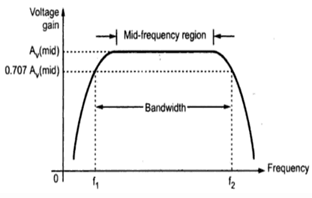Test: General Frequency Consideration - Electronics and Communication Engineering (ECE) MCQ
11 Questions MCQ Test Analog Circuits - Test: General Frequency Consideration
The frequency f1 and f2 from the below picture are respectively called

| 1 Crore+ students have signed up on EduRev. Have you? Download the App |
At 3dB cut-off frequency the voltage gain will be
A voltage amplifier has a voltage gain of 100.What will be gain at 3dB cut-off frequencies
What is the roll-off rate of single order filter
If the output power from an audio amplifier is measured at 100W when the signal frequency is 1kHz, and 1W when the signal frequency is 10kHz. Calculate the dB change in power.
If the output power from an audio amplifier is measured at 100W when the signal frequency is 1kHz, and 1W when the signal frequency is 10kHz. Calculate the dB change in power.
If an electronic system produces a 48mV output voltage when a 12mV signal is applied, calculate the decibel value of the systems output voltage gain
|
3 videos|33 docs|64 tests
|
|
3 videos|33 docs|64 tests
|












